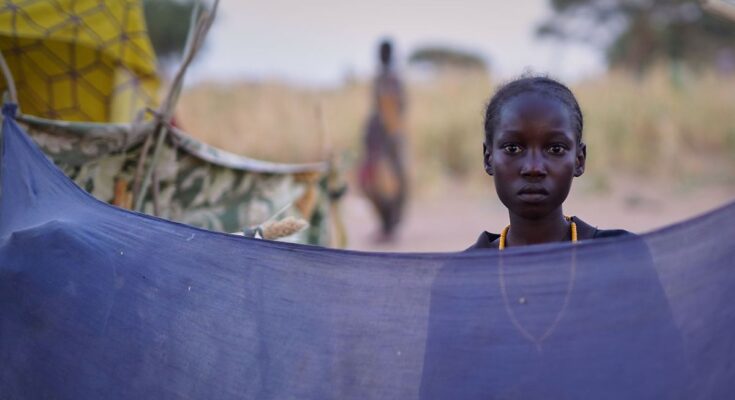The Forgotten WarSudan is experiencing the greatest humanitarian disaster of our time

Instigated by the United Arab Emirates (UAE), Russia, Iran and Egypt, and allowed by the rest of the world: a bloody tragedy is unfolding in Sudan and is receiving little attention. Further destabilization of the region would also impact Europe.
The war in Sudan has long been more than just a regional conflict. This threatens East Africa’s stability, driving millions of people to flee and opening up new zones of influence for authoritarian states. The fact that this suffering has received little attention compared with other wars is not simply an expression of political overwhelm – it is a reflection of a world order that selectively sees compassion where it is uncomfortable. While the world is thinking about Gaza and Ukraine, Sudan is plunging into the greatest humanitarian disaster of our time. Since April 15, 2023, a merciless power struggle has been taking place there between the regular armed forces (SAF) under General Abdel Fattah al-Burhan and the paramilitary Rapid Support Forces (RSF) led by Mohamed Hamdan Dagalo, known as Hemedti. An internal power struggle has turned into a widespread war that has forced more than 13 million people to flee – a number that continues to rise every day.
The humanitarian impact is very bad. According to the UN, some 25 million people – almost half the population – need immediate help. More than 80 percent of hospitals in the war zone have been destroyed or closed, and diseases such as cholera are spreading uncontrollably. Prices of basic foodstuffs have risen by more than 200 percent and many areas have been cut off from humanitarian aid as convoys have been looted or blocked. In Darfur, where violence is particularly brutal, observers now openly speak of genocide.
No protection, no care, no perspective
The town of al-Fashir in particular, the last major stronghold of the regular army in the west of the country, has become a symbol of despair. After months of siege by the RSF, ethnically motivated massacres, looting and displacement occurred. Satellite imagery documents the extent of the damage, and witnesses report arbitrary executions. Now the survivors are trying to flee to surrounding villages – with no shelter, no supplies, no prospects.
With the RSF now controlling much of southern and western Sudan, observers warn of a permanent split in the country – a scenario similar to that in Libya. Despite the enormity of this disaster, international reaction has been muted. The UN Security Council condemned the use of starvation and sexual violence as weapons of war in Resolution 2736, but no concrete action was taken. So far only a third of the amount of aid needed has been promised. Donor countries, exhausted by their involvement in Ukraine and the Middle East, appear to have given up on Sudan.
The conflict has long threatened to explode the country’s borders. Neighboring countries such as Chad, South Sudan and Egypt are under increasing pressure. Chad already hosts around 900,000 refugees, mostly women and children. The supply situation in the camps is precarious.
Powerful countries are behind the conflicting parties
Geopolitical proxy wars are also taking place behind the front lines. The United Arab Emirates is said to supply weapons to the RSF and profit from Sudanese gold smuggling. Egypt and Iran support regular armies, while Russia seeks to gain a permanent foothold in the Red Sea with a naval base in Port Sudan. Even though Saudi Arabia is trying to mediate, Saudi Arabia is pursuing its own security policy in the maritime sector. Sudan has long been an arena for global power politics.
For Europe, this war was not a distant crisis. Berlin and Brussels warn of new refugee movements towards the Mediterranean. Many of the migrants waiting in Calais, France, to cross into the UK, are from Sudan. Nevertheless, the EU’s commitment remains limited – fear of the failure of stabilization operations such as those in Afghanistan or Mali paralyzes the ability to act politically.
In addition to human tragedy, there is the threat of cultural loss on a scale that is difficult to measure. Museums, archives and ancient sites are now nothing but ruins. German archaeologists report looting of excavations at Naga and Meroe, remnants of the ancient Kush Empire. UNESCO warned of “cultural destruction” in the country.
However, amidst the horror, there are still signs of courage and humanity. Networks of local women, doctors and village elders organized emergency relief in besieged towns, documented war crimes and tried to maintain social cohesion. Their work is an act of silent resistance to the collapse of civilization.
The war in Sudan has long been more than just a regional conflict. This threatens East Africa’s stability, driving millions of people to flee and opening up new zones of influence for authoritarian states. The fact that this suffering has received so little attention compared with other wars is not just an expression of political overwhelm – it is a reflection of a world order that selectively sees where compassion is uncomfortable.



